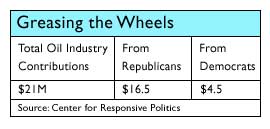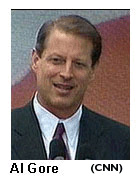|
GOP gushes over oil
|
 |
October 9, 2000: 10:28 a.m. ET
For the petroleum industry, the hope for the presidency is clear
By Staff Writer Jake Ulick
|
NEW YORK (CNNfn) - With the White House race a virtual toss up, many businesses seeking political influence are hedging their bets, splitting campaign contributions between Democrats and Republicans.
But not Big Oil. While the casino industry and computer lobby donate nearly equally to the major parties, the nation's petroleum producers have given almost 80 percent of their election money to Republicans, according to the Center for Responsive Politics.
And who can blame them?
George W. Bush, the GOP nominee, calls for opening up oil exploration on some federal lands, a move supported by the American Petroleum Institute, the industry's voice in Washington. Vice President Al Gore, Bush's opponent, opposes the plan.
"I think Bush would be a clear favorite," Greg Valliere, political economist at Charles Schwab, said of the oil business.
Click here for full CNN.com election coverage
Bush, the governor of oil-rich Texas, and running mate Dick Cheney, a former oil CEO, have close ties to the industry. But Gore, the author of "Earth in the Balance," his 1992 call to protect the environment, is critical of the petroleum business.

"I think the biggest concern (about Gore within the industry) would be on the environmental front," said Steve Curbow, a vice president of Independent Investment Advisors who covers the petroleum business.
A pocketbook issue
Not since the Persian Gulf War has oil played this big a role in political dialogue, the corporate boardroom and the dinner table. The price of the commodity has tripled over the last 18 months, hitting a 10-year high of $37 a barrel in September. Economists say the gains, which amount to a tax on consumers and business, threaten to stall an economy in a record ninth year of expansion.
Concerned about higher prices, the Clinton administration released some of the nation's emergency oil reserve last month - a move immediately criticized by Republicans as a political ploy to help Gore win on Nov. 7.
The American Petroleum Institute opposed the release.
Oil prices fell somewhat in October. But analysts fret that a cold winter could pressure costs as consumers and business demand more fuel.
Click here for a look at energy prices
In the first presidential debate last week, Bush accused the Clinton administration of having no oil policy. Two days later Cheney, in a back-and- forth exchange with Gore's running mate Sen. Joseph Lieberman, made a similar charge.
"My assessment is there is no comprehensive oil policy today," Cheney said
 Bush, concerned about the nation's dependence on overseas oil, would increase oil exploration on some federal lands - specifically the Artic National Wildlife Refuge. The Democrats oppose leasing the refuge for drilling. Gore calls these lands a "treasure." Bush, concerned about the nation's dependence on overseas oil, would increase oil exploration on some federal lands - specifically the Artic National Wildlife Refuge. The Democrats oppose leasing the refuge for drilling. Gore calls these lands a "treasure."
Instead, Gore wants more fuel conservation measures to ease demand. And as he has with drug companies, the vice president has used tough language against the oil business.
"The general tone of the rhetoric form Gore has been quite hostile," Schwab's Valliere said.
An industry takes a lickin'
In a way, Gore can afford to be hostile. Like lawyers and journalists, the oil industry is hardly the public's favorite. Their profits often rise with the price of oil, just as consumers are feeling pinched. And in a stain that lingers, the Exxon Valdez ran aground off the coast of Alaska in 1989, spilling 10.8 million gallons of oil into Prince William Sound.
At the same time, the industry no longer holds the financial and cultural clout it did 20 years ago when the country fixated on who shot J.R. Ewing, the oil executive played by Larry Hagman in the popular television series "Dallas."
The oil business as a share of the economy has shrank as the country shifts from an industrial economy to one dominated by services and technology.
The politics of business: During the final month of the 2000 campaign, CNNfn.com will examine how key industries would fare under a Bush presidency or a Gore presidency. Each Monday and Thursday, CNNfn.com will turn its attention to a new sector. On Thursday, we will profile what each candidate would mean for the defense industry.
At its peak in 1981, total energy expenditures accounted for 14 percent of GDP, according to the Energy Information Administration, a unit of the Energy Department, while petroleum accounted for 8 percent. As of 1995, the share for total energy has fallen to 7 percent and petroleum has fallen even further to just over 3 percent.
At the same time, the industry's political contributions have barely grown in recent years, unlike other businesses, which have increased donations.
According to the Center for Responsive Politics, the oil industry has given $16.5 million to Republicans in this election cycle. The figure, which includes political action committees, soft money and individual donations, is much smaller for the Democrats: $4.5 million.
Vince White, vice president of communication and investor relations at Devon Energy (DVN: Research, Estimates), an Oklahoma-based oil and gas producer, said the industry simply prefers the Republican approach of less a involvement in the oil business
"The consensus view in the industry is that it's very naïve to think that price- fixing will help to reconcile the supply and demand situation," said White. "If you are not going to allow access to public lands to develop resources than the industry will go elsewhere and that does not bode well for the citizens of the U.S."
At the same time, a Bush-Cheney administration is about psychology as much as issues. The two men, after all, are oil people. Bush founded a Texas oil exploration outfit in the late 1970s. Cheney is the former head of Halliburton Co. (HAL: Research, Estimates), the Dallas-based energy services company. And Cheney comes from Wyoming, which has an oil-industry presence.
Click here for a look at energy stocks
Seeking an ear
In a speech last month, Red Cavaney, president of the American Petroleum Institute, said the oil industry wants "greater access" to oil and natural gas resources on U.S. lands both on and offshore to reduce reliance on oil imports.
The API, Caveney continued, wants a "more balanced" approach to environmental regulations.
The institute, which lobbies for oil interests, does not endorse candidates. Still, a spokesman, Mike Shanahan, appeared critical of the current administration.
"The basic issue is we've gone a long time without really thinking about these issues," he said.
Shanahan says environmental rules have prohibited the building of refineries, making oil delivery tougher. And advanced technology means that drilling is less environmentally intrusive than it once was. Contrary to what some environmentalists may believe, the industry, Shanahan says, believes in the need for some regulation. It just wants to adjust requirements that are dated.
Beneath the surface
Sure, the oil industry would like to see a Bush-Cheney White House. But analysts say a series of issues cloud the election landscape.
Among the foremost: the United States, no matter how much conservation or exploration occurs, will always be dependent on oil imports.
Americans use about 74 percent of the world's oil and consume about 19.41 million barrels of crude a day, about half of which is imported, according to the Energy Department. Experts don't see that ratio changing dramatically.
 The 11 OPEC nations, pressured by Washington to keep increasing output, supply the world with 40 percent of its oil, a situation also unlikely to see much alteration. The 11 OPEC nations, pressured by Washington to keep increasing output, supply the world with 40 percent of its oil, a situation also unlikely to see much alteration.
And Steve Curbow, of Independent Investment Advisors, said the industry's hope for exploration, if dashed, won't significantly damage the business. At the same time, the Democrats, though critical of Big Oil, hardly want to cripple an enterprise responsible for the nation's most widely used commodity.
The caveats continue. Whatever the president does is dependent on Congress, whose political makeup - Republicans are now the majority party -- could change next year.
And one key piece of history shows the candidates closer on oil than any of their remarks suggest.
In 1990, President Bush, with guidance from a former defense secretary named Dick Cheney, went to war against Iraq in part to lower oil prices. On Capitol Hill, Senators Gore and Lieberman crossed party lines to support the move. 
|
|
|
|
|
 |

|

